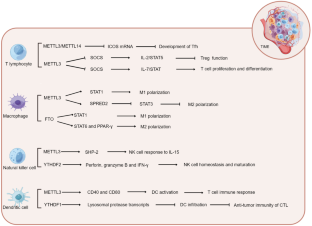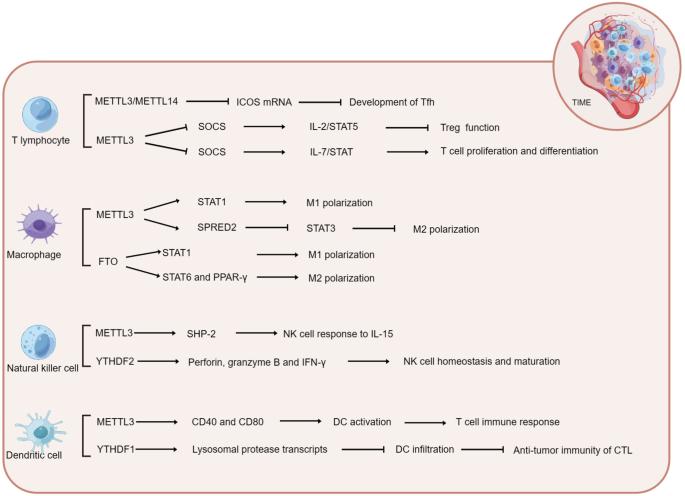Manipulating the tumour immune microenvironment by N6-methyladenosine RNA modification
IF 4.8
3区 医学
Q1 BIOTECHNOLOGY & APPLIED MICROBIOLOGY
引用次数: 0
Abstract
N6-methyladenosine (m6A), a posttranscriptional regulatory mechanism, is the most common epigenetic modification in mammalian mRNA. M6A modifications play a crucial role in the developmental network of immune cells. The expression of m6A-related regulators often affects carcinogenesis and tumour suppression networks. In the tumour microenvironment, m6A-modified enzymes can affect the occurrence and progression of tumours by regulating the activation and invasion of tumour-associated immune cells. Immunotherapy, which utilises immune cells, has been demonstrated to be a powerful weapon in tumour treatment and is increasingly being used in the clinic. Here, we provide an updated and comprehensive overview of how m6A modifications affect invasive immune cells and their potential role in immune regulation. In addition, we summarise the regulation of epigenetic regulators associated with m6A modifications in tumour cells on the antitumour response of immune cells in the tumour immune microenvironment. These findings provide new insights into the role of m6A modifications in the immune response and tumour development, leading to the development of novel immunotherapies for cancer treatment.


通过N6-甲基腺苷RNA修饰操纵肿瘤免疫微环境
N6-甲基腺苷(m6A)是一种转录后调控机制,是哺乳动物 mRNA 中最常见的表观遗传修饰。M6A 修饰在免疫细胞的发育网络中起着至关重要的作用。m6A 相关调节因子的表达往往会影响致癌和肿瘤抑制网络。在肿瘤微环境中,m6A修饰酶可通过调节肿瘤相关免疫细胞的活化和入侵,影响肿瘤的发生和发展。利用免疫细胞的免疫疗法已被证明是治疗肿瘤的有力武器,并越来越多地应用于临床。在此,我们对 m6A 修饰如何影响侵袭性免疫细胞及其在免疫调节中的潜在作用进行了最新、最全面的概述。此外,我们还总结了肿瘤细胞中与 m6A 修饰相关的表观遗传调节因子对肿瘤免疫微环境中免疫细胞抗肿瘤反应的调控。这些发现为了解 m6A 修饰在免疫反应和肿瘤发生中的作用提供了新的视角,有助于开发新型免疫疗法来治疗癌症。
本文章由计算机程序翻译,如有差异,请以英文原文为准。
求助全文
约1分钟内获得全文
求助全文
来源期刊

Cancer gene therapy
医学-生物工程与应用微生物
CiteScore
10.20
自引率
0.00%
发文量
150
审稿时长
4-8 weeks
期刊介绍:
Cancer Gene Therapy is the essential gene and cellular therapy resource for cancer researchers and clinicians, keeping readers up to date with the latest developments in gene and cellular therapies for cancer. The journal publishes original laboratory and clinical research papers, case reports and review articles. Publication topics include RNAi approaches, drug resistance, hematopoietic progenitor cell gene transfer, cancer stem cells, cellular therapies, homologous recombination, ribozyme technology, antisense technology, tumor immunotherapy and tumor suppressors, translational research, cancer therapy, gene delivery systems (viral and non-viral), anti-gene therapy (antisense, siRNA & ribozymes), apoptosis; mechanisms and therapies, vaccine development, immunology and immunotherapy, DNA synthesis and repair.
Cancer Gene Therapy publishes the results of laboratory investigations, preclinical studies, and clinical trials in the field of gene transfer/gene therapy and cellular therapies as applied to cancer research. Types of articles published include original research articles; case reports; brief communications; review articles in the main fields of drug resistance/sensitivity, gene therapy, cellular therapy, tumor suppressor and anti-oncogene therapy, cytokine/tumor immunotherapy, etc.; industry perspectives; and letters to the editor.
 求助内容:
求助内容: 应助结果提醒方式:
应助结果提醒方式:


